Tricia Goyer's Blog, page 23
January 5, 2025
Trusting God in Uncertain Times
If we’re honest, life these days feels a bit like being on a rollercoaster you didn’t choose to ride. You’re holding on for dear life while wondering if the operator is asleep at the switch. (Spoiler alert: He’s not—more on that later.) Whether it’s the economy, the news, your health, or just trying to keep the pantry stocked with snacks your kids won’t devour in one sitting, uncertainty seems to be the theme of the season.

Here’s the thing: uncertainty might shake our schedules, but it doesn’t have to shake our faith. God hasn’t abandoned the controls. He’s not pacing in heaven saying, “Wow, I didn’t see this coming.” No, He’s got this—and He’s got us. Let’s talk about how we can trust Him even when the world feels wobbly.
When Life Feels Uncertain, God Remains SteadyThe Bible is packed with promises that speak directly to uncertain times. I mean, God knew we’d need some reassurance when life felt like it was unraveling. Let these truths sink into your heart:
“For I know the plans I have for you,” declares the Lord. “Plans to prosper you and not to harm you, plans to give you hope and a future.” (Jeremiah 29:11)Write this verse down and place it somewhere visible to remind yourself that God’s plans are always good.
“Do not worry about tomorrow, for tomorrow will worry about itself.” (Matthew 6:34)
Each night, take five minutes to thank God for today and release your worries about tomorrow in prayer.
“Be still, and know that I am God.” (Psalm 46:10)
Set aside a moment of quiet each day to focus on God’s presence and let go of distractions.
The world may feel shaky, but our God is unshakable. He is faithful, sovereign, and 100% in control.
3 Practical Ways to Trust God More DeeplyTrusting God sounds great in theory, but let’s get practical. Here are three ways you can build trust in God, even when life feels unpredictable:
1. Start Your Day with SurrenderPicture this: Your alarm goes off, and instead of diving straight into the chaos (hello, emails and breakfast battles), you pause. You take a deep breath and pray:
“Lord, I trust You with today. I trust You with my to-do list, my worries, and even that thing I’m scared to say out loud. Help me walk in Your peace.”
Set a reminder on your phone to pray first thing in the morning, even before checking your messages.
2. Stay Anchored in God’s WordWhen life feels out of control, Scripture is your lifeline. Make it a habit to read, reflect, and even write down verses that remind you of God’s faithfulness. Stick them on your fridge, your bathroom mirror, or anywhere you’ll see them often.
Need a plan? Try focusing on verses about God’s peace, provision, and promises. A few favorites:
“The Lord is my shepherd; I shall not want.” (Psalm 23:1)“Cast all your anxiety on Him because He cares for you.” (1 Peter 5:7)Choose one verse to memorize this week and repeat it whenever you feel anxious.
3. Lean on CommunityYou don’t have to walk this road alone. Find a tribe of women who will pray for you, encourage you, and remind you of God’s truth when you forget. Whether it’s a Bible study, a prayer partner, or your favorite Christian podcast, connection matters.
Reach out to a friend or join a group this week where you can share your heart and grow in faith together.
Reframing the Struggle: God’s Bigger PictureNow, let’s flip the script. What if the uncertainty you’re facing isn’t just a problem to solve but an opportunity to grow? What if God is using this season to draw you closer to Him, to deepen your faith, and to show you His faithfulness in ways you’ve never experienced before?
Journal about a time God turned a difficult situation into a blessing and reflect on how He might be working now.
Think about Joseph in the Bible. From the pit to the palace, his life was one plot twist after another. But through it all, God was working behind the scenes, weaving a story that brought hope and redemption—not just for Joseph but for an entire nation.
Keeping Your Cool When Life Doesn’t Go as PlannedLet’s be real: trusting God doesn’t mean you’ll have perfect patience every time life throws a curveball. (Spoiler: I haven’t mastered this either.) But here are a few ways to keep your cool:
Pray First: Before you react, take it to God.Pause for ten seconds to pray before responding to stressful situations.
Pause for Perspective: Step back and remember that God is in control, even when you feel out of control.
Take a short walk or breathe deeply to reset your mindset when frustration hits.
Speak Life: Choose words that build up, not tear down. As Proverbs 15:1 reminds us, “A gentle answer turns away wrath.”
Write down one kind phrase you can use when tensions rise, like, “Let’s work through this together.”
One Hope-Filled Last Thought
Friends, life is unpredictable, but God’s character never changes. He is faithful, good, and working all things for His glory and your good—even when you can’t see it.
As Lamentations 3:22–23 says, “His mercies are new every morning; great is Your faithfulness.”So when the world feels shaky, hold tight to the Rock that never moves. Lean into His promises, surround yourself with community, and rest in the truth that He is working all things for your good.
At the end of the day, write down three ways you saw God’s faithfulness, no matter how small they might seem.
Let’s trust Him together, one uncertain day at a time.
Call to Action: What verse or promise helps you trust God when life feels uncertain? Share it in the comments—I’d love to hear from you!
~Tricia
Want more insight? Join us in reading Job on the Daily Bible podcast!  LISTEN &
LISTEN &  WATCH
WATCH
Weekly readings for the Daily Bible Podcast with Tricia and Michelle
January 6 | Genesis 18–21 Faithfulness in the Unfolding of God’s Promises
Faithfulness in the Unfolding of God’s Promises
In today’s journey, we witness the mingling of divine promise and human frailty, culminating in the birth of Isaac, a long-awaited fulfillment of God’s word.
Genesis 18: The Promise and the PleaThe narrative begins with an extraordinary visit to Abraham and Sarah’s tent. Three men, one of whom is recognized as God, bring a message that defies belief: Sarah, well beyond childbearing age, will bear a child. Sarah’s laughter, a mix of disbelief and fear, echoes our doubts in the face of the improbable. Yet, is anything too hard for God? Abraham’s earnest plea for Sodom reveals his compassionate heart, negotiating for the city’s salvation, albeit in vain.
Genesis 19: The Fall of Sodom and GomorrahThe destruction of Sodom and Gomorrah is a grim reminder of the consequences of unchecked wickedness. Lot’s moral choices within the city paint a dark picture of human nature. The narrative takes a distressing turn when Lot’s daughters’ actions lead to the origins of the Moabites and Ammonites, who later become enemies of God’s people.
Genesis 20: Abraham’s Fear and God’s SovereigntyAs Abraham and Sarah move again, Abraham’s fear leads him to repeat a past mistake, claiming Sarah as his sister. King Abimelech’s near-misstep, prevented by God’s intervention, shows how divine sovereignty often waylays human decisions.
Genesis 21: The Fulfillment of God’s PromiseFinally, the promise is fulfilled with Isaac’s birth. Sarah’s joyous laughter replaces her earlier skepticism, marking a moment of divine faithfulness and human transformation.
Word of the Day: FaithfulnessDefinition: Steadfast loyalty and trustworthiness in fulfilling promises and commitments.
God’s faithfulness is like a relentless pursuit, a love that never gives up. From Adam and Eve to Abraham, we see His loyalty and provision. Abraham’s story, in particular, reflects this faithfulness: God’s assurance of countless descendants and His choice of Abraham for his potential to lead his family in righteousness.
ApplicationsSeek God in Doubt: When doubts arise, remember that nothing is too hard for the Lord. Lean into His Word for reassurance.
Trust God’s Timing: Like Abraham and Sarah, trust that God’s promises will be fulfilled in His perfect timing, even when circumstances seem impossible.
Rely on God’s Faithfulness: Recognize that God’s plans for you are not contingent on your perfection but on His steadfast love and mercy.
January 7 | Genesis 21:8-34, 22-23, 11:32, 24 Tapestry of Faith, Trials, and Divine Provision
Tapestry of Faith, Trials, and Divine ProvisionIn today’s journey, we witness the profound interplay of human emotion, divine intervention, and God’s providence in the lives of Abraham, Sarah, Hagar, Isaac, and Ishmael. These narratives showcase God’s faithfulness amidst trials and His provision at critical moments.
Genesis 21:8-34A family at a crossroads. Sarah’s concern about Ishmael’s influence on Isaac leads to the difficult decision to send Hagar and Ishmael away. In the wilderness, Hagar reaches the brink of despair, but God intervenes, providing a well of water and renewing His promise to Ishmael.
Genesis 22Abraham faces the ultimate test of faith when God commands him to sacrifice Isaac. His unwavering trust is evident in his assurance to Isaac: “God will provide a sheep for the burnt offering.” At the crucial moment, God provides a ram, reaffirming His faithfulness and Abraham’s trust.
Genesis 23Sarah’s passing marks a somber chapter, but Abraham’s negotiation for a burial site reflects his ongoing faith in God’s promise of the land for his descendants.
Genesis 11:32The mention of Terah’s death ties the narrative back to the start of Abraham’s journey, reminding us of God’s overarching plan and promises spanning generations.
Genesis 24As Abraham grows older, the focus shifts to Isaac’s future. Abraham’s servant embarks on a mission to find a wife for Isaac, guided by God’s providence. Rebekah’s encounter at the well highlights her faith and God’s orchestration in bringing her to Isaac.
Word of the Day: ProvisionDefinition: The act of supplying or making available what is needed; a measure of care or preparation in advance.
From Hagar’s well to the ram on Mount Moriah, we see God’s provision in the most desperate moments. This divine care reminds us of His readiness to supply our needs, often in ways we least expect.
Living in Light of God’s ProvisionTrust in God’s Timing: Just as Abraham assured Isaac of God’s provision, we can trust God to meet our needs at the right moment.Recognize Divine Orchestration: From Rebekah’s encounter at the well to the ram provided for Abraham, God’s hand guides the details of our lives.Rest in God’s Care: Even in the wilderness of despair, as Hagar experienced, God sees and responds to our cries.Walk in Faithfulness: Abraham’s willingness to follow God’s command, even when it seemed incomprehensible, is a powerful example of faith in action.God’s provision reminds us that His care is unwavering and sufficient, guiding us through every trial and triumph.
January 8 | Genesis 25, 1 Chronicles 1:28-34 The Legacy We Leave
The Legacy We Leave
As we delve into today’s readings, we encounter the intricate dynamics of Abraham’s family and witness God’s promises unfolding through generations. These stories reveal His faithfulness amidst human flaws and invite us to reflect on the legacy we are building.
Genesis 25: Abraham’s Expanding LineageAfter Sarah’s passing, Abraham fathered six sons with Keturah, but Isaac remained the heir of God’s covenant promise. Ishmael’s twelve descendants became chieftains, fulfilling God’s promise yet living in ongoing tension with their kin.
This lineage underscores the broad scope of God’s promise in Genesis 12:7, where Abraham’s descendants begin to emerge as nations through Sarah, Hagar, and Keturah.
Isaac and Rebekah: Mirroring Faith and TrialsIsaac’s story mirrors that of his parents: a barren wife and fervent prayer for a child. Rebekah’s pregnancy with twins is both an answer to prayer and the beginning of a new chapter of sibling rivalry, setting the stage for future nations and God’s redemptive plan.
Sibling Rivalry: A Recurring ThemeFrom Cain and Abel to Ishmael and Isaac, and now Jacob and Esau, sibling conflict weaves through the narrative. These stories highlight human frailty and the complexity of family dynamics, yet they also testify to God’s ability to work His purpose through our imperfections.
Word of the Day: ProvisionDefinition: The act of supplying or preparing what is needed in advance.
Through these narratives, God’s provision shines:
For Hagar and Ishmael: Water in the wilderness and a promise for Ishmael’s future.For Isaac and Rebekah: A miraculous answer to prayer through the birth of twins.For Abraham: Continued blessings for his descendants and the fulfillment of God’s promises.Living a Legacy of Faith and ProvisionRecognize God’s Faithfulness: Like Isaac and Rebekah, trust that God hears and answers prayers, even in prolonged seasons of waiting.Shape Your Legacy: Through daily actions and intentional decisions, build a legacy that honors God and blesses future generations.Embrace God’s Provision: Trust that God will provide for every need, even in moments of trial or conflict.Reflect on Relationships: Learn from the stories of sibling rivalry, seeking peace and reconciliation in your relationships.Let these lessons from Genesis inspire us to trust in God’s provision and build a legacy that reflects His faithfulness.
January 9 | Genesis 25:27-34, Genesis 26, Genesis 27, Genesis 28:1-5 God’s Everlasting Goodness
God’s Everlasting Goodness
In today’s reading, we delve into the complex dynamics of Isaac’s household. From sibling rivalry to divine faithfulness, the stories of Esau and Jacob remind us of the intricate interplay between human frailty and God’s unshakable goodness.
Esau and Jacob: Contrasts and ConsequencesThe tale begins with a striking contrast between the twins. Esau, the rugged hunter, is favored by his father, Isaac. Jacob, the thoughtful homebody, is cherished by his mother, Rebekah.
Esau’s impulsive decision to trade his birthright for a bowl of stew showcases short-sightedness, while Jacob’s cunning demonstrates the pitfalls of ambition unchecked by trust in God. These choices set the stage for a lifetime of conflict and divine intervention.
Isaac’s Faith Amid FamineIsaac’s response to famine mirrors Abraham’s journey. Like his father, Isaac claims Rebekah as his sister, revealing a pattern of fear and self-preservation. Yet, God’s faithfulness is evident in Isaac’s prosperity, even amidst tension with Abimelech over wells.
Isaac’s story is a testament to God’s provision and blessings despite human shortcomings. His journey reminds us that God’s promises remain steadfast, even when we falter.
Deception and Divine BlessingThe narrative crescendos as Jacob, with Rebekah’s guidance, deceives Isaac to secure the firstborn’s blessing. Esau’s anger forces Jacob to flee to Uncle Laban, marking a turning point in their saga.
Through these events, God’s goodness is unmistakable. His promise to Isaac—that his descendants would be as numerous as the stars—remains a beacon of hope amidst human flaws and failures.
Word of the Day: GoodDefinition: Morally excellent, virtuous, or righteous; beneficial and desirable.
God’s goodness permeates these chapters, showing His faithfulness and love even in our brokenness:
Esau and Jacob: God works through their imperfections, guiding His plan despite human mistakes.Isaac’s Prosperity: Blessings abound even when fear and doubt cloud Isaac’s decisions.Promises Fulfilled: The covenant with Abraham continues through Isaac, showcasing God’s unwavering goodness.Reflecting God’s Goodness in Our LivesEmbrace God’s Promises: Remember that His faithfulness remains, even when we fall short.Make Thoughtful Choices: Avoid Esau’s impulsiveness or Jacob’s deceit, choosing instead to trust God’s timing.Model God’s Goodness: Reflect His character in your relationships, offering grace and compassion.Recognize Patterns: Learn from Isaac’s repetition of Abraham’s mistakes and strive to break cycles of fear and mistrust.Let us strive to reflect God’s goodness in our choices, trusting in His plans even when life feels uncertain.
January 10 | Genesis 28:6-22, Genesis 29, Genesis 30:1-24 God Remembered Rachel
God Remembered Rachel
Today’s reading brings us into a whirlwind of dreams, weddings, and the birth of nations, where human drama and divine intervention intertwine to shape the legacy of faith.
Esau’s Decision and Jacob’s DreamThe story begins with Esau’s decision to marry into Ishmael’s lineage, adding layers of complexity to Isaac’s family dynamics. Esau’s choices seem to defy his father’s guidance, reinforcing the tension within this storied household.
Meanwhile, Jacob, journeying to Uncle Laban, encounters God in a dream. He sees a ladder connecting heaven and earth, a powerful symbol of God’s accessibility and presence. Charles Spurgeon describes this as the “God of Bethel,” revealing that God is not distant but deeply involved in earthly matters.
Jacob’s response at Bethel is transformative. He erects a memorial pillar, names the place the “House of God,” and vows to dedicate a tenth of his blessings back to the Lord. This marks a pivotal step in Jacob’s faith journey, reflecting a growing awareness of God’s closeness and care.
Love, Deception, and the Birth of a NationJacob’s story takes a romantic yet complicated turn as he falls in love with Rachel. His willingness to labor for seven years for her hand speaks to the depth of his love. Yet Laban’s deception on Jacob’s wedding night, substituting Leah for Rachel, adds a layer of irony and pain. This twist leads Jacob to work another seven years for Rachel.
Amidst this drama, the births of Jacob’s children through Leah, Rachel, and their maids establish the foundations of the twelve tribes of Israel. Leah’s story, in particular, resonates with those who feel overlooked. Despite being less favored, Leah finds recognition and love in God’s eyes through her children.
Word of the Day: RememberedDefinition: Brought to mind or given attention; noted or cared for.
God’s remembrance is a central theme in this passage:
Hagar and Leah: Both women, often marginalized in their stories, are seen and valued by God.Rachel’s Prayer: “God remembered Rachel” (Genesis 30:22) underscores His perfect timing and unwavering care.Jacob at Bethel: Jacob’s dream reminds him—and us—that God always remembers His promises.God’s Remembrance in Our LivesTrust God’s Timing: Like Rachel, know that God sees your struggles and answers in His perfect time.Find Value in God’s Love: Leah’s story teaches us that even when overlooked by others, we are cherished by God.Respond in Worship: Jacob’s memorial at Bethel inspires us to acknowledge and thank God for His presence in our lives.See Struggles as Opportunities: Challenges, like those faced by Jacob, Leah, and Rachel, can be the context for God’s transformative work.This passage is a powerful reminder that God’s plans unfold perfectly, even amidst our imperfections and challenges. He remembers us, works through our lives, and weaves our stories into His greater narrative.
. January 10 | Genesis 28:6-22, Genesis 29, Genesis 30:1-24 God as Our Witness in Jacob’s Journey
God as Our Witness in Jacob’s Journey
The story of Jacob continues with deep family complexities, workplace challenges, and God’s providence guiding him every step of the way. As we read through Genesis 30 and 31, we witness faith, resilience, and God’s unwavering presence amidst life’s dramas.
Jacob’s Family and Work LifeJacob’s household is a tapestry of relationships filled with emotion and complexity. Married to Leah and Rachel and fathering children with their maids Bilhah and Zilpah, Jacob’s family dynamic reflects real-life struggles with favoritism, jealousy, and competition.
Meanwhile, Jacob’s strained work relationship with his father-in-law Laban highlights the challenges of injustice. Despite Laban’s repeated attempts to cheat Jacob out of his earnings, Jacob’s faith and clever strategies lead to prosperity, sowing jealousy among Laban’s sons.
Divine Intervention and GuidanceAmidst the tension, God speaks to Jacob, directing him to return to his homeland. This pivotal moment reinforces the theme of divine guidance and care. In a dream, God reassures Jacob that He has seen Laban’s deceit and promises protection, proving that no injustice escapes His notice.
The Departure and Its AftermathJacob, his wives, children, and flocks leave secretly for Canaan, but Rachel’s theft of her father’s idols creates tension. Laban’s pursuit and dramatic confrontation with Jacob could have led to chaos, but God intervenes, warning Laban in a dream not to harm Jacob. Their eventual covenant, marked by a pile of rocks as a witness, brings peace to their relationship and concludes this chapter of Jacob’s journey.
Word of the Day: WitnessDefinition: Someone who sees an event or provides evidence; a testimony to truth.
The concept of “witness” plays a central role in Jacob’s story:
God as Witness: Jacob finds solace in knowing that God sees and acknowledges his struggles with Laban.Witness Pile: The stones between Jacob and Laban symbolize God’s presence as a witness to their covenant.Lessons from Jacob’s JourneyTrust God’s Guidance: Jacob’s obedience to God’s call to return home reminds us to listen for and trust divine direction in our own lives.Stand Firm in Adversity: Despite being wronged, Jacob’s persistence and faith in God lead to eventual justice and peace.Find Comfort in God’s Presence: Knowing that God witnesses every aspect of our lives offers reassurance in times of struggle or misunderstanding.Seek Peace: Like Jacob and Laban’s covenant, work toward reconciliation and peace in strained relationships.Jacob’s journey reminds us that life’s challenges often serve as the backdrop for God’s transformative work. In our moments of feeling unseen or undervalued, we can trust that God is our ultimate witness, providing strength, justice, and hope
January 12 | Genesis 32-35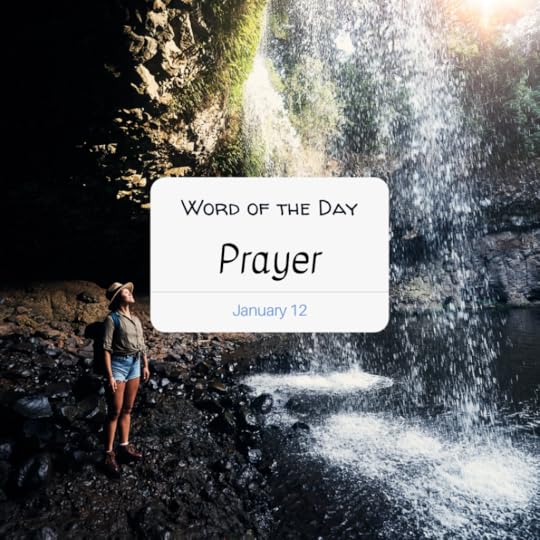 The Power of Prayer
The Power of Prayer
Our readings in Genesis 32-35 capture the transformative journey of Jacob as he navigates fear, reconciliation, and the challenges that ultimately shape his path and legacy.
Encounter with Angels and Fear of EsauJacob’s encounter with angels at the start of his journey back to his homeland is a profound reminder of God’s presence. However, when Jacob hears that Esau is approaching with 400 men, his fear overshadows this divine reassurance. This tension highlights the very human struggle of balancing faith with fear.
Jacob’s Strategy and PrayerIn his anxiety, Jacob divides his camp and sends gifts to Esau in hopes of appeasing him. But his most significant act is turning to prayer. His plea is honest and vulnerable, reminding God of His promises and seeking protection. This moment underscores the power of prayer to align our hearts with God’s will, even amidst uncertainty.
Wrestling with God – A Turning PointJacob’s wrestling match with a divine figure, often seen as a Christophany, becomes the pivotal moment in his spiritual journey. Through this struggle, Jacob earns the name Israel, signifying his perseverance and transformation. It’s a profound metaphor for how our struggles—spiritual, emotional, or physical—can lead to growth and deeper faith.
Brothers Reunited – The Power of ForgivenessJacob’s fear of Esau is met with a completely unexpected response: Esau embraces Jacob. This emotional reunion shows the strength of forgiveness and reconciliation, even after years of estrangement. It’s a powerful example of how fractured relationships can be restored.
The Incident at Shechem – Consequences of ActionsThe narrative turns somber with the violation of Dinah and the subsequent actions of Simeon and Levi. Their retribution brings justice but also sows discord and consequences for Jacob’s family. This story challenges us to consider the weight of our choices and their lasting impacts.
Casting Away False HopesAs Jacob’s family moves toward the Promised Land, they are instructed to discard their pagan idols. This act symbolizes letting go of false hopes and committing fully to God. It prompts reflection on what we might need to relinquish in our own lives to embrace God’s promises.
Word of the Day: PrayerDefinition: A solemn request for help or expression of thanks addressed to God.
Prayer is central to Jacob’s story. From his plea for protection to his wrestling with God, Jacob demonstrates the transformative power of prayer. It serves as a bridge between human vulnerability and divine strength, reminding us to turn to God in every circumstance.
Lessons from Genesis 32-35Rely on Prayer: Like Jacob, turn to prayer in times of fear or uncertainty. It’s a powerful way to seek God’s guidance and align with His promises.Pursue Reconciliation: Esau and Jacob’s reunion shows that forgiveness can heal even the deepest wounds. Seek peace and restoration in strained relationships.Embrace Transformation: Struggles can lead to growth. Like Jacob wrestling with God, allow challenges to refine your faith and character.Let Go of False Hopes: Discard anything that keeps you from fully trusting in God’s promises, just as Jacob’s family cast away idols.Genesis 32-35 teaches us to face our fears with faith, to seek forgiveness and reconciliation, and to trust in God’s plans for our lives. As we navigate life’s challenges, may we be reminded that prayer is our greatest tool for connection and strength.
The post Trusting God in Uncertain Times appeared first on Tricia Goyer.January 2, 2025
Writer’s Desk with Jennifer Deibel
 Writer’s Desk with Jennifer Deibel
Writer’s Desk with Jennifer DeibelJennifer Deibel is the author of A Dance in Donegal (winner of the Kipp Award for Historical Romance), The Lady of Galway Manor, The Maid of Ballymacoo (Selah Winner), and The Irish Matchmaker. With firsthand immersive experience abroad, Jennifer writes stories that help redefine home through the lens of culture, history, and family. After nearly a decade of living in Ireland and Austria, she now lives in Arizona with her husband and their three children.
Connect with Jennifer on her website, Instagram, Facebook, and BookBub, and sign up for her newsletter.
More about Heart of the GlenCan the lonely thread of her life be woven into a new and finer pattern?
When Saoirse Fagan arrives at Drumboe Castle to start her new job as housemaid, she is dismayed to learn that the lord of the house passed away a week prior. Already running from the tragedy that claimed the lives of her family members, Saoirse wanders the road through the darkening glen with nowhere to go until Aileen McCready offers her a lift and a place to stay for the night.
Aileen’s brother, sheep farmer and weaver Owen McCready, is known for his intricate and impeccably woven tweed. But when he’s injured, his entire livelihood is endangered. A new–and distracting—mouth to feed adds fuel to the fire, and Owen struggles to keep his family afloat. Though Saoirse is eager to help, even offering to learn the weaving craft, Owen is hesitant to accept aid from this strange young woman, no matter how inexplicably magnetic he finds her.
But Saoirse is not one to give up easily. She’s determined to convince the McCreadys that they need her–perhaps as much as she needs them.
Purchase a copy of Heart of the Glen here.
Enter to Win One of Two Copies of Heart of the Glen Q&A with Jennifer Deibel
Q&A with Jennifer DeibelARCF: Jennifer, we are so excited to be featuring you and your new book Heart of the Glen this week! Can you tell us a little bit about the inspiration behind Heart of the Glen?
JD: Thank you so much for having me! The hero in Heart of the Glen is a sheep farmer and tweed weaver, who sells his fabric to the famed Donegal Tweed. I’ve always been fascinated by tweed (and a bit perplexed about why it’s so pricey!), and one night I stumbled upon an old documentary highlighting three brothers who farmed and were weavers as well. None of them ever married, and the narrator mourned the fact that their craft would die with them. That planted the nugget of an idea for a story exploring “What if a weaver couldn’t weave anymore?” And thus the idea for Heart of the Glen was born!
ARCF: You have a personal attachment to Ireland (and the reason your books are set in Ireland) can you share why you focus on stories set in beautiful Ireland?
JD: I sure do! My husband and I were blessed to be able to live in Ireland for about 6 years early in our marriage. Our first two years were spent just the two of us in the wilds of County Donegal, and then a few years later, we returned with our daughters and lived in the Galway area for four years, and welcomed our son while there! My debut novel, A Dance in Donegal, was written as a way to process all we’d experienced in our two years up there, and I long to allow people to experience the true Ireland through my stories.
ARCF: Owen McCready in Heart of the Glen is a master tweed weaver — can you explain what a master tweed weaver is and why you decided on this occupation for him?
JD: As I mentioned above, the idea for a story about a weaver was sparked after watching a documentary about one. Harris Tweed in Scotland and Donegal Tweed in Ireland are the two most prolific and famous tweed companies in the world. I discovered that Donegal Tweed utilized “Cottage Weavers” for most of their supply for many, many years before centralizing the production. During difficult economic times, the government created a scheme to help people earn a better living by providing homes (aka cottages) with looms, and then people could learn to weave linen or tweed and sell their wares. It’s a fascinating history, and the more I learned about the painstaking process of weaving tweed, the more I understood the cost of a tweed coat! Master weavers are exactly as they sound—they’ve honed and refined their craft to the highest level. It is their work that makes its way onto the backs of royalty and celebrities and the like.
ARCF: Is there any bit of research about master tweed weavers that didn’t make it into the story?
JD: So much! Haha. I read two books on the history of the craft, and the process of the craft, and most of that just was for my own knowledge so that I could understand my character and how he would have gotten where he is with his skills. There are so many types of looms, dimensions, and other terminology that were I to include it all, the book would’ve been twice as long and read more like a textbook!
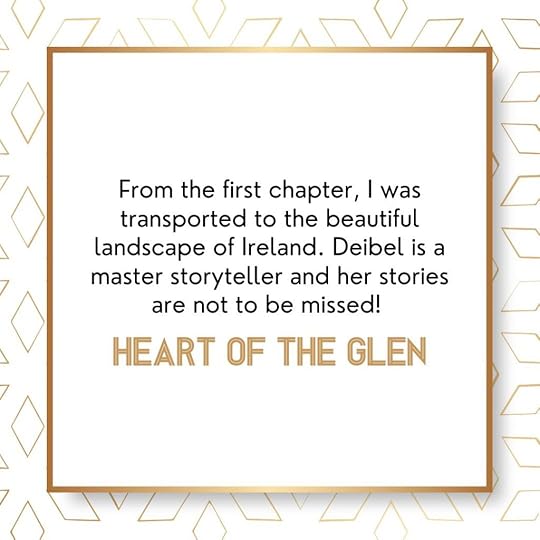
ARCF: What came first for you for Heart of the Glen, the plot or the characters?
JD: Can I say both? Most of my stories start out with a “what if” question. In this case, the question was, “What if a weaver could no longer weave (but needed to)?” So, Owen was pretty much solidified from the start. A secondary question to my what-if was whether or not it was possible for someone who’d never touched a loom before could learn, and how long it would take. And that’s how I knew Saoirse was the right fit there. So, the main characters kind of materialize along with the first nugget of an idea. But the rest of the characters reveal themselves as the plot unfolds.
ARCF: Heart of the Glen is your fifth book — what is your favorite thing about the publishing process?
JD: As odd as it might sound, I have to say it’s the community! From the community of amazing industry professionals I get to work with through every step of the process, to the community of authors God has blessed me to be surrounded with, and the readers/bookish community at large, it’s truly an amazing experience. And sharing a love for the written word, it’s just such a rich blessing!
ARCF: Which character, from all your books, has been most like you?
JD: There’s a little bit of me in most of them, but I think Moira from A Dance in Donegal is the most like me. Probably because her story was how I processed our entire experience in Donegal, I sort of let her be my surrogate self as I analyzed and re-experienced all the incredible sights, sounds, aromas, and flavors of the Emerald Isle for the first time.
ARCF: Which has been your favorite of your books to write and why?
JD: Ooooh, that’s a tough one! I think I have to say my second book, The Lady of Galway Manor. That book just flowed, and I was able to write it in record time, and I truly enjoyed almost every minute of it. I don’t remember hitting the “messy middle” in that story, and the themes in that one are very near and dear to my heart.
ARCF: If we were to get on a plane and head over to Ireland, what would one stop be that we’d have to make while there?
JD: Just one?? LOL. Probably the Cliffs of Moher. They are so breathtaking, and no matter how many times you go, you’re just never quite ready to leave.
ARCF: What’s coming up next for you?
JD: I have a 31-day devotional inspired by Irish blessings coming out next year. I am so excited about this! Each day has an Irish blessing, a few Scriptures that tie into the theme of the blessing, a devotional thought from me, and an application challenge. I can’t wait to share it with you!
Save, Pin, Share


 The post Writer’s Desk with Jennifer Deibel appeared first on Tricia Goyer.
The post Writer’s Desk with Jennifer Deibel appeared first on Tricia Goyer.
January 1, 2025
Creating a Family Memory Capsule
As homeschooling parents, we get to experience so many incredible moments with our children. From the sparkle of understanding during a math lesson to the giggles of a family game night, these moments make homeschooling such a gift. But let’s be honest—life moves fast, and it’s easy to forget the small, beautiful moments that make up our days.
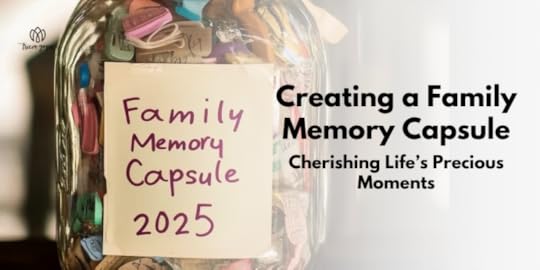
That’s why creating a Family Memory Capsule is such a meaningful project. It’s a simple, heartfelt tradition that helps you capture those fleeting moments, reflect on God’s blessings, and build a legacy of gratitude and joy. Whether you homeschool or not, this activity will bring your family closer together.
What Is a Family Memory Capsule?A Family Memory Capsule is a container for collecting mementos, notes, photos, and other small treasures throughout the year. It is a time capsule designed to preserve special memories.
At the end of the year—between Christmas and New Year’s—you’ll open it together as a family. It’s a chance to reflect on the joys, challenges, and blessings of the year while celebrating the journey God has led you through.
Why Create a Family Memory Capsule?Capturing Family Moments: Keep track of all the special events and everyday joys that make your family unique.Reflecting on God’s Blessings: See how God has been faithful through the highs and lows of your year.Building Family Traditions: Create a meaningful activity your children will want to carry on with their own families.What to Include in Your Family Memory CapsuleThe beauty of this project is that it’s completely customizable! Here are some ideas to inspire you:
Small MementosTicket stubs from family outings like museums or amusement parks.Wrappers or packaging from a favorite family treat.Souvenirs like seashells, pressed pennies, or postcards.PhotosPrint snapshots from homeschool activities, vacations, or everyday life.Add silly or candid photos for extra fun.Written NotesJot down funny quotes your kids say or memorable conversations.Write prayers, reflections, or things you’re thankful for.Have each family member write their favorite memory of the year.Growth TrackersMeasure your children’s height using ribbons or strings. Label and date the measurements before placing them in the capsule.Homemade KeepsakesInclude drawings, crafts, or short stories created by your kids.How to Make Your Family Memory Capsule1. Choose Your CapsuleYou can use a decorated shoebox, a mason jar, or a plastic container. Let your kids decorate it to make it uniquely yours.
2. Set a Spot for ContributionsKeep the capsule somewhere accessible so everyone can easily add to it throughout the year.
3. Make It a Weekly HabitIncorporate adding to the capsule into your homeschool schedule or do it after special events.
4. Choose a Date to Open ItPick a day between Christmas and New Year’s to gather as a family and open the capsule. Enjoy hot cocoa, light candles, and take time to reflect together.
Scripture to Inspire Your Reflection
Creating a Family Memory Capsule is a wonderful way to pause and thank God for His faithfulness. Use these Scriptures during your reflection time:
“Give thanks to the Lord, for he is good; his love endures forever.” – Psalm 107:1“Teach us to number our days, that we may gain a heart of wisdom.” – Psalm 90:12“But Mary treasured up all these things and pondered them in her heart.” – Luke 2:195 Tips to Make the Memory Capsule Tradition SpecialChoose a Theme for the Year: Pick a word, Scripture, or focus for your family, and include items that reflect that theme.Gratitude Jars: Have each family member write notes of thankfulness throughout the year and add them to the capsule.Prayer Requests: Write prayer requests at the beginning of the year and include updates on how God answered them.Fun Facts About Each Family Member: Include favorite books, songs, or activities to see how interests change.Celebrate Big: Make the capsule-opening day a family event with a special meal or slideshow of photos.Share Your Ideas!I’d love to hear how your family creates and uses a Family Memory Capsule. What special mementos will you include? Share your ideas in the comments below to inspire other families to cherish their moments, too.
Closing ThoughtsA Family Memory Capsule isn’t just a box of keepsakes; it’s a treasure trove of joy, growth, and God’s blessings. By making this a yearly tradition, you’re creating a legacy of thankfulness that your children can carry into their future families while capturing the joy of family, celebrating God’s blessings, and creating a tradition that lasts a lifetime.
So why wait? Start your Family Memory Capsule today and experience the joy of capturing family moments in a way that lasts a lifetime.
Blessings,
Tricia

Need more ideas and advice on homeschooling? Pick up a copy of Homeschool Basics. Receive tried-and-true homeschool advice from veteran homeschooling moms Tricia Goyer and Kristi Clover. We dish out practical help on getting started and staying the course. Homeschool Basics will remind you that the best homeschooling starts with the heart. Packed with ideas to help you push aside your fears and raise kids who will grow to be life-long learners. Kristi and I believe that homeschooling can transform your life, your home, and your family. Mostly, we believe homeschooling can truly prepare your children for the life God’s called them to live. Don’t let doubts hold you back any longer. Get Homeschool Basics on Amazon Now!
The post Creating a Family Memory Capsule appeared first on Tricia Goyer.December 31, 2024
Daring to Dream
Here we are, standing at the start of a brand-new year, full of possibility and promise. If you’re anything like me, you’ve probably spent some time reflecting on where you’ve been and dreaming about where you want to go. For me, 2025 is all about daring. Daring to dream, daring to try new things, daring to trust God in deeper ways.

As a health coach, author, and busy mom, life is often a juggling act, but this year, I want to approach it with a little more courage and a lot more joy. Let me share some of my plans, dreams, and goals—and maybe they’ll inspire you to embrace a daring year, too.
My Word for 2025: DaringChoosing a word for the year helps me focus on what matters most. This year, “daring” reminds me to step outside my comfort zone, take risks, and trust God to meet me in those unknown places.
For me, daring means saying “yes” to things I’ve been hesitant about—whether it’s exploring new opportunities in coaching, trying something fun with my family, or writing down stories I’ve carried for years.
What about you? If you could choose one word to shape your year, what would it be?
Fun Bucket List for 2025While I love setting purposeful goals, I also believe in planning for joy. Life is too short not to sprinkle in a little fun! Here’s what I’m daring to try in 2025:
Go to a concert featuring one of my favorite singers from the 80s. (Yes, I’ll be singing along, off-key and unapologetic.)Roller skate like it’s 1989. I’m not promising there won’t be a few falls, but I’ll be laughing all the way.Listen to Christian rock on vinyl. Music has a way of grounding me and bringing back the sweetest memories.Draft a memoir of my most memorable Gen-X moments. It’s time to write down those stories that make me laugh, cry, and reflect.Take on a home photography challenge. I’ll be capturing unique angles of everyday objects in my backyard, appreciating beauty in the ordinary.What’s on your fun list? I’d love to hear your ideas—you might inspire me to add more to mine!
Health and Wellness GoalsAs a health coach, I know how important it is to focus on small, sustainable changes. This year, I’m daring to challenge myself to prioritize my wellness, not just for myself but to inspire those I coach.
Here’s how I’m keeping it simple:
Drinking a glass of water before my coffee every morning.Taking 10 minutes each day for a gratitude walk.Exploring new healthy recipes with my family (whoever tries it without complaint gets a gold star!).What’s one small habit you can try this year? Let’s take those steps together.
Spiritual Focus: Trusting God in Bigger WaysDaring to trust God more deeply is my heart’s biggest goal for 2025. This year, I’m leaning into His promises, believing that He has incredible plans—not just for me but for you too.
Lamentations 3:22–23 reminds us, “The faithful love of the Lord never ends! His mercies never cease. Great is His faithfulness; His mercies begin afresh each morning.”Isn’t that amazing? Each day is a fresh start, a chance to experience God’s goodness anew.
Daring to Inspire OthersOne of my greatest joys is connecting with people, whether it’s through writing, coaching, or simply sharing stories. I want you to know that you don’t have to navigate your health, faith, or dreams alone. Let’s dare to pursue joy, wellness, and purpose together this year.

If you’re ready to make 2025 your best year yet, let’s connect! Whether it’s setting health goals, building new habits, or finding encouragement for your faith journey, I’d love to walk alongside you.
Call to Action: What’s your word for 2025? Do you have a bucket list or a daring goal? Share it in the comments—I’d love to cheer you on!
Here’s to a daring and joy-filled 2025, my friends!
~Tricia
The post Daring to Dream appeared first on Tricia Goyer.December 30, 2024
Winding Down After the Holidays and Moving into the New Year
The Christmas tree might still be twinkling, and a few scraps of wrapping paper might be hiding in the corners, but the holidays are officially behind us. The house is full of sweet memories, but let’s face it—routines? They’re nowhere to be found! For homeschooling families, the shift from holiday chaos back to structured schedules can feel a bit overwhelming, not just for parents but for kids, too.

If your kids are anything like mine, the post-holiday season brings all the emotions. There’s excitement over new gifts, a twinge of sadness that the fun is over, and maybe some resistance to letting go of those relaxed holiday vibes. Let’s be real—it’s not easy to transition back to “normal,” but easing into it with intentionality, patience, and a good dose of grace can make all the difference.
Taking Time to DecompressBefore we dive headfirst into lesson plans and to-do lists, let’s hit pause for a moment. The holidays are filled with joy but can also be overwhelming for little hearts and minds. A family-wide reset can help everyone refocus and feel ready for what’s ahead.
Even Jesus recognized the importance of balance and rest. In Mark 6:31, He said, “Come with me by yourselves to a quiet place and get some rest.” Isn’t that a perfect reminder, especially after a busy season? Taking time to breathe and recharge is not only good for us but essential for a smooth transition into the new year.
5 Ways to Ease Back into Routine1. Start SlowlyJumping back into full homeschool days might feel like hitting a brick wall. Instead, ease into it with half-days or focus on just a couple of subjects to start. Spend extra time on fun activities like read-alouds or reviewing favorite lessons.
A visual schedule or checklist can be a lifesaver. Letting kids see what’s coming can help them feel more in control and less overwhelmed.
2. Reclaim Bedtimes and MorningsLet’s be honest: holiday schedules often stretch bedtime to the max. Now’s the time to gradually reel it back in. Consistent sleep routines help everyone feel more rested and ready for the day.
Remember Psalm 127:2: “He gives to His beloved sleep.” Healthy sleep habits are truly a gift for your kids—and for you too!
3. Reflect on the Holidays and Look AheadGather your family and reminisce about the season’s highlights. What were your favorite moments, lessons, or blessings? Then, shift the focus to the year ahead.
Set some family goals—big or small. Maybe it’s reading a certain number of books, learning a new skill, or planning a fun field trip. Having something to look forward to makes the transition feel exciting instead of daunting.
4. Get MovingAfter all those holiday treats and cozy days, it’s time to get those bodies moving! Plan a nature walk, a family dance-off, or even a round of tag in the backyard. Physical activity can re-energize your kids and set a positive tone for the day.
As Proverbs 17:22 says, “A cheerful heart is good medicine.” Movement and laughter go hand in hand to lighten the mood.
5. Revisit Your Homeschool VisionWhy did you choose to homeschool? What’s your family’s “why”? This is a great time to share your heart with your kids and remind them of the bigger picture—how homeschooling reflects God’s plans and purposes for your family.
If your current curriculum or schedule isn’t working, you can make changes. Flexibility is a gift of homeschooling, so embrace it!
Grace for the TransitionLet’s be real: transitions can be messy. It’s easy to get frustrated when things don’t go as planned. But God has given us the grace we need to guide our families, even when the days feel hard.
Pray First: Start each day by asking God for wisdom and patience. As James 1:5 reminds us, “If any of you lacks wisdom, you should ask God, who gives generously to all without finding fault, and it will be given to you.”Take Breaks: If the tension rises, take a step back. A quick breather can help everyone reset.Speak Life: Proverbs 15:1 says, “A gentle answer turns away wrath, but a harsh word stirs up anger.” Kind words can diffuse frustration and bring peace to your day.Looking Ahead with HopeThe start of a new year is a beautiful reminder of God’s mercies, which are new every morning (Lamentations 3:22–23). As you transition from holiday chaos to daily life, keep your focus on what truly matters: faith, family, and the lessons God is teaching through homeschooling.

With rest, connection, and a little patience, you’ll find joy in the process—and so will your kids. Here’s to a peaceful, hope-filled start to your new year!
Happy New Year and happy homeschooling!
~Tricia
Homeschool Success Course
Are you feeling overwhelmed and uncertain about your homeschooling journey? Do you wish you had a roadmap to help you navigate the challenges and achieve success? Look no further than Tricia Goyer’s Homeschool Success video course! Tricia Goyer is a homeschooling expert with over 20 years of experience, and she has poured all of her knowledge and wisdom into this comprehensive course. In each video, Tricia shares practical tips and strategies for homeschooling, from choosing a curriculum to managing your time effectively.
With Homeschool Success, you’ll discover how to:Create a customized curriculum that meets your family’s unique needsDevelop a daily routine that maximizes your time and energyCultivate a love of learning in your children and inspire them to reach their full potentialFoster a positive homeschooling environment that nurtures relationships and builds characterNavigate the challenges of homeschooling with confidence and graceTricia’s warm and engaging teaching style will leave you feeling empowered and equipped to tackle any homeschooling challenge that comes your way. You’ll also receive a workbook with actionable steps and reflection questions to help you apply your learning to your homeschooling journey. Take advantage of this opportunity to learn from one of the most respected homeschooling experts in the industry. Enroll in Tricia Goyer’s Homeschool Success video course today and start your journey to homeschooling success!
Homeschool Success Course only $9 Purchase the course here.The post Winding Down After the Holidays and Moving into the New Year appeared first on Tricia Goyer.December 29, 2024
Write Your Legacy
I still remember the day I met my biological grandfather. I was already an adult, and growing up, I had met him. Yet, there I was, sitting in his living room, hearing about a faith-filled family history I’d never been part of. He shared stories of pastors and missionaries in our family tree, but what moved me most was the gift he handed me as I left—his Bible.

It wasn’t just any Bible. The pages were worn, the margins filled with his notes, underlined verses, and personal reflections. As I flipped through it, I saw the evidence of a man who loved Jesus and leaned on His promises. That Bible became a treasure, not because of its monetary value, but because it carried a legacy of faith.
That day, I decided I wanted to leave the same gift for my children. I wanted my prayers, my thoughts, and my faith journey to speak to them long after I’m gone. That’s when the idea of a Legacy Bible was born.
Why Your Bible Can Be Your LegacyWe all want to leave something behind that matters. Sure, heirlooms are nice, and cookie recipes can warm a kitchen, but a Legacy Bible? That can warm hearts for generations.
A Legacy Bible is more than a book. It’s a tangible reminder of your faith, filled with notes, prayers, and reflections. It’s a gift that says, “This is what carried me through, and I want it to carry you too.”
In a world of fleeting texts and temporary posts, a handwritten Bible stands out. It’s a bridge between your heart and the hearts of your loved ones—a way to connect your story to God’s story and theirs.
Getting Started: No Perfection RequiredStep 1: Find Your Bible
Choose a journaling Bible with wide margins for notes and reflections. Don’t stress about making it perfect—your words are what matter most.
Step 2: Start Small
Focus on one verse at a time. Write a short prayer or share a story about how that Scripture impacted your life.
Step 3: Make It Personal
Include the moments that defined your faith:
Your kids don’t need a theological masterpiece—they need you.
My Legacy Bible JourneySince that day with my grandfather, I’ve created Legacy Bibles for five of my children, and I’m working on more. Each Bible is a labor of love, filled with my prayers and reflections. Some pages have tear-stains. Others have coffee stains. (Life happens.)
One of my favorite verses to include is James 1:27:“Pure and genuine religion in the sight of God the Father means caring for orphans and widows in their distress and refusing to let the world corrupt you” (NLT).
This verse led my husband and me to adopt seven children. Writing about it in my children’s Legacy Bibles has been my way of sharing how God shaped our family and our faith.
Why This MattersYour Legacy Bible isn’t just for today—it’s for the moments your loved ones will face years from now. It’s for the day they need encouragement, wisdom, or a reminder that God is faithful.
Imagine your child flipping to a note where you wrote, “This verse gave me strength when I didn’t think I could take one more step. I pray it does the same for you.”
Your words today can echo in the hearts of your family tomorrow.
Sticky Moments for Your Legacy BibleMark Milestones: Highlight the Scripture that spoke to you when you accepted Christ or faced a major life decision.Pray Specifically: Write prayers for your child’s future spouse, career, or faith journey.Add Humor: Don’t be afraid to include something lighthearted, like, “Praying you remember this verse when you’re frustrated with your siblings!”Tips for a Lasting LegacyTake Your Time: Don’t feel pressured to fill the entire Bible. This is a journey, not a race.Be Creative: Doodle, highlight, or write mini devotionals in the margins. Make it uniquely yours.Stay Honest: Share your struggles as well as your victories. Your authenticity will resonate with your family.A Legacy Worth LeavingThe beauty of a Legacy Bible is that it’s not just a gift—it’s a lifeline. It’s a way to say, “I love you, and this is the faith that carried me through. May it carry you too.”
Start today. Open your Bible, grab a pen, and let your heart pour out onto the pages. What you write now might be exactly what your family needs to read years from now.
Because when it comes to leaving a legacy, it’s not about perfection. It’s about connection.
And in a fleeting world, nothing connects hearts like a handwritten Bible filled with love, faith, and truth.
Ready to start your own Legacy Bible?
Want more insight? Join us in reading Job on the Daily Bible podcast!  LISTEN &
LISTEN &  WATCH
WATCH
Weekly readings for the Daily Bible Podcast with Tricia and Michelle
December 30Revelations 15:1 – 18:24
 The Seven Bowls and the Fall of Babylon
The Seven Bowls and the Fall of Babylon
As we continue our journey through Revelation, we find ourselves immersed in vivid imagery, powerful symbolism, and divine judgment. Today’s chapters unveil the completion of God’s wrath, the fall of Babylon, and the ultimate sovereignty of God’s plan. Let’s explore the significance of these events and what they mean for our faith.
The Prelude to Judgment (Revelation 15)Revelation 15 preludes to the final judgments. John witnesses seven angels delivering seven last plagues, symbolizing the completion of God’s wrath.
A breathtaking scene unfolds:
Victors over the beast stand beside a sea of glass mixed with fire, singing the song of Moses and the song of the Lamb.Their song celebrates God’s marvelous deeds, justice, and eternal reign:“Great and marvelous are your deeds, Lord God Almighty. Just and true are your ways, King of the nations” (Revelation 15:3).
This chapter sets the stage for the pouring out of the seven bowls, emphasizing God’s justice and the finality of His judgment.
The Seven Bowls of Wrath (Revelation 16)Revelation 16 unveils the seven bowls of God’s wrath, each representing a catastrophic judgment:
Painful Sores: Harmful sores afflict those with the mark of the beast.Sea Turns to Blood: The sea becomes blood, and all sea life dies.Rivers and Springs Turn to Blood: God’s judgment reflects the bloodshed caused by the wicked.Scorching Heat: The sun scorches people with intense heat, yet they do not repent.Darkness Over the Beast’s Kingdom: Darkness plunges the beast’s kingdom into agony.Drying of the Euphrates: The river dries up, preparing the way for the kings of the East and the battle at Armageddon.The Great Earthquake: A devastating earthquake splits the great city into three parts. Hailstones fall, and Babylon is given the cup of God’s wrath.Despite the severity of these judgments, people continue to curse God and refuse to repent, highlighting the hardness of human hearts.
The Judgment of Babylon (Revelation 17-18)Revelation 17 introduces the judgment of the great prostitute, symbolizing a corrupt and idolatrous system aligned with the beast. She is described as:
Dressed in luxury, holding a golden cup filled with abominations.Drunk on the blood of saints and witnesses of Jesus.John’s readers likely recognized her as Rome, the city of seven hills, but the symbolism extends beyond Rome to represent any worldly system that seduces people away from God.
Revelation 18 shifts to the fall of Commercial Babylon:
Merchants, kings, and sailors mourn Babylon’s destruction, lamenting the loss of wealth and luxury.The chapter underscores the fleeting nature of earthly riches and the ultimate futility of placing trust in worldly systems.Amid this judgment, we hear a call to God’s people:“Come out of her, my people, so that you will not share in her sins or receive any of her plagues” (Revelation 18:4).
This is a powerful reminder to separate ourselves from the world’s corrupt systems and align our lives with God’s kingdom.
Word of the Day: SevenDefinition: Completeness, perfection, and salvation.
Revelation is saturated with the number seven—seven churches, seals, trumpets, bowls, and more. The prominence of this number is not accidental; it symbolizes God’s perfect and complete plan.
From the seven days of creation to the sevenfold judgments in Revelation, the number seven points to the fullness of God’s sovereignty. As Revelationlogic.com explains, “A seven-fold entity in scripture generally refers to the wholeness of that entity from start to finish, and it comes as an oath from God.”
In Revelation, the seventh element often stands out as unique or final, marking the culmination of God’s purposes.
How Can We Apply This?Live with Eternal PerspectiveRevelation 18 reminds us that earthly riches and systems will ultimately fail. Are we investing in things of eternal value?Heed God’s Call to Holiness
“Come out of her, my people” is a call to live set apart from the world’s corruption. Are there areas where we need to break ties with sin or idolatry?Trust in God’s Sovereignty
The recurring use of seven reminds us that God’s plan is perfect and complete. Even in the chaos of judgment, He is in control.Prepare for the Marriage Supper of the Lamb
The fall of Babylon leads to the ultimate celebration: the marriage supper of the Lamb. Let’s live as people eagerly awaiting this joyous event, staying faithful to our King.Closing Thought
Revelation 15-18 presents a sobering picture of God’s final judgment but also a call to trust in His justice and mercy. The fall of Babylon reminds us that this world is temporary, but God’s kingdom is eternal.
Let’s live with an eternal perspective, heeding God’s call to holiness, and trusting in His perfect plan.
“Blessed are those who are invited to the wedding supper of the Lamb!” (Revelation 19:9).December 31Revelation 19:1 -22:21
 The Glorious Conclusion
The Glorious Conclusion
As we conclude our journey through Revelation and the Bible, we stand in awe of Christ’s ultimate triumph, the final defeat of evil, and the eternal hope secured for God’s people. These final chapters combine every promise, prophecy, and act of God’s justice and mercy into a breathtaking crescendo of glory.
Revelation 19: The Marriage Supper of the LambHeaven erupts in jubilant praise as the great multitude declares:“Hallelujah! Salvation and glory and power belong to our God” (Revelation 19:1).
The marriage of the Lamb is announced, a moment that symbolizes the union of Christ and His Church:
The bride, clothed in fine linen, represents the righteousness of the saints.This union reflects the culmination of God’s redemptive work, as we are made holy and prepared for eternity with Him.The chapter shifts to the triumphant return of Christ, the Rider on the white horse, the King of Kings, and the Lord of Lords. His eyes blaze like fire, His robe is dipped in blood, and His name is the Word of God. With His return comes the defeat of the beast and the false prophet, marking the ultimate overthrow of evil.
Revelation 20: The Millennium and Final JudgmentThe narrative moves to the Millennium, a thousand years of Christ’s righteous reign:
Satan is bound, and peace prevails.The first resurrection brings life to the faithful, who reign with Christ during this time.However, after the Millennium, Satan is released for a final rebellion. His defeat is swift and decisive as he is cast into the lake of fire for eternity.
The Great White Throne Judgment follows, where all are judged according to their deeds. Those not found in the Book of Life face eternal separation from God. This solemn event reminds us of the gravity of our choices and our hope in Christ.
Revelation 21-22: The New Heaven and New EarthIn these final chapters, John describes the breathtaking vision of the new heaven, new earth, and the holy city, the new Jerusalem:
“Behold, the dwelling place of God is with man. He will dwell with them, and they will be his people” (Revelation 21:3).The city shines with God’s glory, adorned with precious stones and illuminated by the Lamb, who is its light.The river of the water of life flows through the city, and the tree of life provides healing for the nations. Every curse is lifted, and God’s people will see Him face to face, living in eternal light and peace.
The book closes with a promise:“Behold, I am coming soon! Blessed is the one who keeps the words of the prophecy of this book” (Revelation 22:7).Word of the Day: Amen
Definition: A declaration of agreement, meaning “so be it.”
The word “Amen” resounds throughout Revelation as a powerful affirmation of God’s eternal promises. From the heavenly chorus in chapter 19 to the final verses of chapter 22, “Amen” reflects the fulfillment of God’s plan and our agreement with His purposes.
This word reminds us to trust in God’s sovereignty, to worship Him with reverence, and to hope for the day when we will dwell with Him forever.
How Can We Apply This?Live in HopeRevelation 21 reminds us of the promise of a new heaven and earth. Despite life’s struggles, we can hope for God’s eternal kingdom.Stay Faithful
The marriage supper of the Lamb is a reminder to live as the bride of Christ, ready and pure, devoted to our Savior.Trust in God’s Justice
The Great White Throne Judgment assures us that God’s justice will prevail. Let’s live with integrity, trusting in His perfect judgment.Worship with Awe
The heavenly scenes in Revelation inspire us to worship God with awe and gratitude. Let’s make worship a daily act of devotion.Closing Thought
Revelation 19-22 is not just the Bible’s conclusion but the fulfillment of God’s eternal story. It reminds us that evil will be defeated, God’s justice will prevail, and we will dwell with Him forever.
As we finish this journey, let’s echo the final words of Scripture:“Amen. Come, Lord Jesus! The grace of the Lord Jesus be with God’s people. Amen” (Revelation 22:20-21).January 1
Genesis 1-2, Genesis 3:1-24
 Back to the Beginning
Back to the Beginning
As we open the pages of Genesis, we step back to the dawn of creation. Through the Bible, we witness the story of the world’s beginning, where every word and act reflect the power and majesty of God.
Genesis 1: The Divine Symphony“In the beginning, God created.” These five words form the foundational chords of a divine masterpiece. Each day of creation showcases the perfection and power of God’s Word.
Here’s how creation unfolds:
Day 1: Light is separated from darkness, defining day and night.Day 2: The sky and the air are formed, creating the atmosphere.Day 3: Land emerges, accompanied by the sprouting of vegetation and plants.Day 4: Celestial bodies, including the sun, moon, and stars, are set in the sky.Day 5: Birds take flight, and fish swim in the waters.Day 6: Land animals and humans are created.This chapter isn’t just a story of origins; it’s a declaration of God’s absolute authority and love. Each element of creation, declared good by God, reflects His glory and care. As we read, let’s marvel at the beauty and intricacy of God’s work as a reflection of His character.
Genesis 2: A Holy Rest and Divine ProvisionOn the seventh day, God rests, setting a pattern of Sabbath—a divine rhythm of work and rest.
The chapter also introduces the Garden of Eden, a place of God-given provision and presence. Amidst this paradise, humanity faces its first test. The Tree of Knowledge of Good and Evil symbolizes the choices that define our lives.
Genesis 3: Temptation and the FallThis chapter brings us face to face with temptation and its consequences. The serpent’s craftiness leads Adam and Eve to eat from the forbidden tree, resulting in the entry of sin into the world.
Lessons on Authority, Choice, and ConsequenceGod’s Loving AuthorityGod’s authority, as Creator and Sustainer, is not restrictive but protective. His commands are rooted in love and wisdom.The Struggle with Choice
Eve’s choice, influenced by the serpent, reveals our human tendency to rationalize desires. Yet, every choice carries a consequence.The Role of Divine Boundaries
Respecting God’s boundaries protects us and guides us toward His best. Ignoring them invites brokenness and separation from Him.Word of the Day: Authority
Definition: The power to influence or command thought, opinion, or behavior.
Reflection: God’s authority as Creator is the ultimate source of comfort and guidance. As we live under His authority, we can trust His plans and commands to be good, perfect, and loving.
ApplicationThese chapters remind us of the importance of keeping our hearts attuned to God’s voice. Through His Word, we discern the right path and avoid the snares that lead us astray.
Reflect on God’s authority as your Creator and how His love shapes His boundaries.Consider how you respond to temptation and the importance of aligning your choices with God’s will.Take time to marvel at the beauty of creation and how it reflects the character of God.Closing ThoughtGenesis 1-3 sets the stage for the grand narrative of redemption. As we navigate life’s complexities, let’s remember that God, our Creator, lovingly provides guidance, protection, and the promise of restoration.
January 2Genesis 4-6, 1 Chronicles 1:1-4
 Justice and Grace
Justice and Grace
Today’s reading covers Genesis 4-6 and a brief glimpse into 1 Chronicles 1. These chapters weave together themes of justice, mercy, and God’s enduring grace in the face of humanity’s failings.
Genesis 4-5: Cain, Abel, and the Genealogy of HumanityOur journey begins with the tragic tale of Cain and Abel. In a fit of jealousy, Cain murders his brother, a heartbreaking testament to the destructive power of sin. Yet even in this moment of profound injustice, God’s mercy shines.
Justice and Compassion: God punishes Cain but also protects him, marking him to ensure he isn’t harmed. This dual act underscores God’s justice tempered with compassion.Genesis 5 then chronicles the lineage from Adam to Noah, a genealogy marked by both faithfulness and the weight of sin. Lamech’s words about his son Noah hint at the world’s struggle post-Eden:
"He will comfort us in the labor and painful toil of our hands caused by the ground the Lord has cursed.” (Genesis 5:29)1 Chronicles 1: The Genealogy Tied to Israel’s StoryThis chapter briefly recounts the lineage from Adam to Noah, bridging the creation narrative to the story of Israel. It reminds us that God’s plan spans generations and unfolds through His chosen people.
Genesis 6: The Wickedness of Humanity and the Faith of NoahAs the world grows and thrives, so does its wickedness. Genesis 6 reveals God’s sorrow over humanity’s corruption:
"The Lord regretted that he had made human beings on the earth, and his heart was deeply troubled.” (Genesis 6:6)Yet, amidst the darkness, Noah emerges as a beacon of righteousness. He walks faithfully with God, and through him, God provides a way of escape—a testament to grace amidst judgment.
Lessons: The Dance of Justice and GraceThe Balance of Justice and MercyCain’s story reminds us of God’s ability to balance justice with mercy. While consequences for sin are inevitable, God’s heart is still tender toward His creation.Walking in RighteousnessNoah’s integrity in a corrupt world is a powerful example of the impact one faithful person can have. His obedience leads to preservation, not just for himself but for all creation.God’s Grief Over SinGod’s sorrow in Genesis 6 reflects His deep care for humanity and His desire for a relationship with us.Hope in RedemptionEven as judgment looms, God provides a way forward, pointing to His ultimate plan of redemption through Jesus Christ.Word of the Day: JusticeDefinition: The maintenance or administration of what is just, especially by the impartial adjustment of conflicting claims or the assignment of merited rewards or punishments.
Reflection: God’s justice is perfectly balanced with His mercy. He holds us accountable for our actions while providing grace and redemption through His love.
ApplicationReflect on how you balance justice and mercy in your life. Are there areas where you need to extend more grace to others?Consider Noah’s example. How can you walk faithfully with God, even in challenging circumstances?Acknowledge the grief sin causes God and turn to Him with a heart of repentance and trust in His grace.Closing ThoughtThe stories of Cain, Abel, and Noah remind us of our dual longing for justice and grace. As we live in the tension between these two truths, let us draw near to the God who perfectly embodies both, offering hope and redemption through His enduring love.
January 3Genesis 7, Genesis 8, Genesis 9, Genesis 10:1-5, 1 Chronicles 1:5-7
 Respecting God’s Authority
Respecting God’s Authority
Today’s reading invites us into the chapters of Genesis 7-10 and a brief glimpse into 1 Chronicles 1. These passages recount the story of the flood, its aftermath, and the genealogies that followed. While these chapters are often skimmed, they are rich with themes of God’s justice, human nature, and His enduring grace.
Genesis 7-9: The Flood and Its AftermathGenesis 7: Noah’s faithfulness is evident as he obeys God’s command to enter the ark with his family and pairs of living creatures. The floodwaters—a symbol of judgment and cleansing—cover the earth, erasing life outside the ark. This chapter underscores the severity of sin’s consequences and God’s provision for new beginnings.
Genesis 8: As the waters recede, a phrase rings out: “God remembered Noah.” This isn’t just about memory; it signifies God’s care and faithfulness. Noah’s first act upon leaving the ark is building an altar, an expression of worship and gratitude. God then makes a promise never to destroy the earth with a flood again, symbolized by the rainbow—a timeless sign of hope and His enduring covenant with humanity.
Genesis 9: Even righteous Noah, chosen to preserve life, has a moment of vulnerability. The incident involving Noah’s drunkenness and the curse on Canaan reveals the complexities of human nature and the far-reaching consequences of our actions.
Genesis 10 & 1 Chronicles 1: The Genealogies of NationsIn Genesis 10 and 1 Chronicles 1, we encounter genealogies that detail humanity’s spread across the earth. These lineages, though often overlooked, are significant.
Japheth’s descendants become seafarers and pioneers.Ham’s lineage includes Nimrod, a mighty warrior and founder of cities like Babylon and Nineveh.Shem’s line leads to Abram, a pivotal figure in biblical history.These genealogies remind us that every life contributes to the unfolding of God’s plan. They’re not just names but stories, each playing a part in the grand narrative of faith.
Themes: Justice, Mercy, and GraceGod’s JusticeThe flood demonstrates God’s righteous judgment against sin. It’s a sobering reminder of the weight of our choices.God’s MercyDespite humanity’s failures, God provides a way forward. The ark symbolizes preservation, and the rainbow is a sign of His enduring promise.Human NatureNoah’s story illustrates the tension between our moments of faithfulness and our vulnerabilities.Hope and PurposeThe genealogies show that God’s plan spans generations, weaving together lives and stories into His redemptive purpose.Word of the Day: RespectDefinition: A feeling of deep admiration for someone or something elicited by their abilities, qualities, or achievements.
The story of Noah and the flood, as well as the genealogies we read today, reminds us to respect God’s authority and His promises. Noah’s obedience, even in a world full of wickedness, shows respect for God’s word. The rainbow stands as a sign of God’s respect for His covenant with creation.
Let us live lives of respect—toward God, His creation, and the people He has placed in our lives. Respect isn’t just about admiration; it’s about honoring God with our choices, as Noah did.
ApplicationReflect on God’s Promises: Consider how the rainbow reminds us of God’s faithfulness and enduring grace.Acknowledge Human Frailty: Learn from Noah’s faithfulness but also recognize the need for God’s mercy in our moments of failure.Find Meaning in Genealogies: Every life has significance in God’s plan. How can you contribute to His purpose in your life and the lives of others?Closing ThoughtThrough the flood, the covenant, and the genealogies, we see God’s justice, mercy, and grace woven into humanity’s story. As we continue this journey through the Bible, let us open our hearts to learn, grow, and find our place in this grand narrative of faith.
January 4Genesis 11:1-26, 1 Chronicles 1:24-27, Genesis 11:27-31, Genesis 12, Genesis 13, Genesis 14
 Persistence in Faith
Persistence in Faith
In today’s reading, we delve into the stories of Genesis 11-14 and 1 Chronicles 1:24-27, uncovering lessons of persistence, faith, and the long-lasting effects of our decisions.
Genesis 11: The Tower of Babel
Human ambition led to the construction of the Tower of Babel, a monument to human pride rather than divine purpose. God intervened, confusing their languages and scattering them. This reminds us that persistence must align with God’s plans to succeed.
Abram (later Abraham) emerges as a central figure of faith, as chronicled in 1 Chronicles 1:24-27. He demonstrates persistence in following God’s call, leaving his homeland for an unknown destination. His unwavering obedience, even in uncertainty, is an example of faith in action.
Abram’s persistence in trusting God’s provision is seen in his handling of conflict with Lot. He allows Lot to choose first, trusting God to provide for his needs. While Lot chooses the fertile Jordan Valley near Sodom and Gomorrah, Abram continues to honor God through worship and humility.
Abram persistently fights for his family, rescuing Lot from captivity during a regional conflict. His encounter with Melchizedek, king of Salem, demonstrates his persistent devotion to God. By refusing the king of Sodom’s wealth, Abram declares his dependence on God as his provider.
Abram’s story highlights the importance of persistence in trusting God. His faith-filled actions shaped his legacy and influenced generations. Similarly, our persistence in faith and obedience today can have far-reaching effects on the lives of those who follow.
Definition: Continuing steadfastly in a course of action despite difficulty or opposition.
Abram’s persistence in obeying God, even when the path was unclear, serves as a powerful example. His unwavering trust in God’s promises reminds us that persistence in faith is vital, even amidst challenges.
January 5Genesis 15, Genesis 16, Genesis 17
 A Lasting Relationship
A Lasting Relationship
In today’s reading, we explore Genesis 15-17, pivotal chapters that reveal God’s intimate and personal relationship with humanity. Through these stories, we see promises, struggles, and faith, all pointing to the profound ways God engages with His people.
Genesis 15: A Covenant of Promise
Abram’s journey takes a momentous turn when God promises him descendants as numerous as the stars.
God seals this promise through a covenant, symbolizing His unwavering commitment. Notably, only God passes between the sacrificial pieces, signifying that He alone bears the responsibility for fulfilling the covenant.
Genesis 16: Struggles and the God Who Sees
Sarai’s barrenness leads her to suggest that Abram father a child with Hagar, her servant. This decision creates tension, resulting in Hagar fleeing into the wilderness. Yet, God meets Hagar in her distress, and she acknowledges Him as “the God who sees me” (Genesis 16:13). Through this interaction, we see God’s compassion and care for even the marginalized.
At 99 years old, Abram encounters God as El Shaddai, God Almighty. This meeting reaffirms God’s covenant and brings transformative changes: Abram becomes Abraham, “father of many,” and Sarai becomes Sarah, “princess.” God establishes circumcision as a covenant sign and promises a son through Sarah, naming him Isaac, the child of promise.
These chapters remind us that God desires a personal, deep relationship with us. He meets us in our faith, our struggles, and even our doubts, offering promises of hope and redemption.
Definition: A connection, association, or involvement between individuals or entities.
These chapters showcase God’s yearning for a relationship with humanity. From His covenant with Abram to His compassionate encounter with Hagar, God’s actions demonstrate a profound commitment to connect with His creation.
The post Write Your Legacy appeared first on Tricia Goyer.December 26, 2024
Small Habits, Big Impact: 6 Simple Ways to Transform Your Life This Year
Every year I tell myself, This is the year! I’m going to be more organized, less overwhelmed, and more intentional about my time with God and my family. Yet, by February, I often feel like I’m spinning my wheels, trying to do too much and still falling short.

Can you relate?
For us homeschool parents, the demands can feel never-ending. Lesson plans, meal prep, extracurricular activities, housework—it’s easy to feel stretched thin. But what if the solution isn’t about doing more but rather incorporating small habits that make a big difference?
Here’s what I’ve learned: tiny shifts can lead to big transformations. These simple, God-centered habits have helped me stay on track and can help you, too.
1. Focus on One Important Thing Each DaySome days, it feels like my to-do list is a mile long, and I get stuck doing a little bit of everything but finishing nothing. Making a long list is overwhelming! The solution? Decide on the ONE most important thing you need to accomplish each day and make it your priority.
It might be calling a friend to encourage them, preparing a science experiment for your homeschool lesson, or simply cleaning out that junk drawer (or junk closet…). Narrowing your focus reduces overwhelm and increases productivity.
Scripture for Reflection:“Commit your work to the Lord, and your plans will be established.” – Proverbs 16:32. Tidy Up as You Go
Make cleaning up a small, daily habit (often more than once a day!). Homeschool life often means chaos—books, papers, and snacks everywhere. Another small habit that’s made a huge difference in our home is tidying up as we go. Are you ever embarrassed when you need to give someone a ride? Do you find yourself having to ask your passengers to excuse the junk mail and trash? When you and your kids leave the car, take a moment to grab trash and belongings. Maybe even keep a designated trash bag or small trash can in the car to catch the trash that usually ends up under the seats. Make this a family rule!
A clean car (and house) not only reduces stress but also teaches kids responsibility.
Scripture for Reflection:“But all things should be done decently and in order.” – 1 Corinthians 14:403. Plan Dinner While Making Breakfast
After a full day of homeschooling and parenting, the last thing you want is to scramble for dinner ideas at 5 p.m. I’d love to be one of those people who has weekly menu plans, but I’ve never been able to be that organized for more than a week. Instead, I take a few moments during breakfast prep to decide what’s for dinner. You can even ask for votes or ideas from the family to get the kids involved!
This simple habit gives you time to thaw ingredients, prep vegetables, or use that slow cooker you’ve been meaning to dust off. Plus, it’s one less decision to make during your busiest time of day.
4. Prioritize Daily Bible ReadingYet another wonderful thing about homeschooling is the unique opportunity to make God’s Word central to our day. Reading the Bible isn’t just for us—it’s a habit we can model for our kids. Start your day by reading a few chapters together at breakfast, and discuss what you learned as a family.
This can become a family devotional time or a way to weave scripture into your homeschool lessons. I love using One Year Bible plans—they’ve transformed how I approach God’s Word. My book Praying Through the Bible in One Year is a great way to get started!
Scripture for Reflection:“Your word is a lamp to my feet and a light to my path.” – Psalm 119:1055. Read a Christian Biography Monthly
Along with reading the Bible together, reading stories of faithful believers has inspired our family to trust God more deeply. Whether it’s George Müller’s unwavering faith in God’s provision or Amy Carmichael’s dedication to rescuing children, Christian biographies are a powerful way to grow your family’s faith.
Reading these stories together not only strengthens your walk with God but also sparks meaningful discussions with your kids about courage, trust, and obedience.
If you’re looking for ideas, my book Prayers That Changed History includes tons of great examples of Christian faith!
6. Keep a Family Prayer JournalWe all know prayer is powerful, and one of the best ways to see God’s hand in your life is by keeping a family prayer journal. Write down prayer requests from each family member, and revisit them regularly to see how God has worked.
This habit builds faith and gratitude and reminds your family of God’s faithfulness.
Scripture for Reflection:“Do not be anxious about anything, but in every situation, by prayer and petition, with thanksgiving, present your requests to God.” – Philippians 4:6A Bonus Tip for Moms: Embrace Grace Over Perfection
On top of everything we do as parents, as homeschooling moms, we often feel pressure to “do it all” in our kids’ education. But remember, God doesn’t call us to perfection—He calls us to faithfulness. Give yourself grace for the days that don’t go as planned! Rest in the knowledge that God is working through your efforts, big and small.
Closing ThoughtsThese small habits—done with intention and faith—can make a big difference in your homeschool journey and family life. By focusing on what truly matters and turning to God daily, you’ll find peace and purpose even in the busiest seasons. Try these six things, and I know you’ll see a HUGE transformation in your family’s lives. “A little goes a long way” has never been truer!
“And let us not grow weary of doing good, for in due season we will reap, if we do not give up.” – Galatians 6:9Here’s to making this year one of faith, family, and meaningful habits.
Blessings,
Tricia

Need more ideas and advice on homeschooling? Pick up a copy of Homeschool Basics. Receive tried-and-true homeschool advice from veteran homeschooling moms Tricia Goyer and Kristi Clover. We dish out practical help on getting started and staying the course. Homeschool Basics will remind you that the best homeschooling starts with the heart. Packed with ideas to help you push aside your fears and raise kids who will grow to be life-long learners. Kristi and I believe that homeschooling can transform your life, your home, and your family. Mostly, we believe homeschooling can truly prepare your children for the life God’s called them to live. Don’t let doubts hold you back any longer. Get Homeschool Basics on Amazon Now!
The post Small Habits, Big Impact: 6 Simple Ways to Transform Your Life This Year appeared first on Tricia Goyer.December 24, 2024
The Reason We Celebrate: A Christmas Reflection
When I think of Christmas, I’m transported back to the cozy gatherings around my grandparents’ dinner table and the simple joys of creating special memories with family. One year, I received a tape recorder, and my family and I spent Christmas Day recording silly stories, using different voices to bring our characters to life. While I no longer have the tape, the joy and laughter of that day remain etched in my heart.

Christmas has always been more about the memories than the presents under the tree. Whether it’s baking a birthday cake for Jesus, singing carols by the light of the Christmas tree, or placing baby Jesus in the manger on Christmas Eve after reading the story from Luke, the true joy of the season lies in celebrating the birth of Christ and creating moments of love and connection.
A Season of Traditions and WonderI love hearing about how others bring the heart of Christmas into their homes:
Linda from New York turned off the lights on Christmas Eve, her husband playing the guitar as they sang carols by the tree.Eileen baked a birthday cake for Jesus with her children to honor the reason for the season.Martha placed a nativity scene in her home each December, letting the youngest child place baby Jesus in the manger after attending a candlelight service.These traditions remind us to focus on the wonder of Christ’s birth. They teach our children—and remind us—that Christmas is about more than decorations, presents, or perfect plans. My husband, John, has a favorite Christmas word. It’s Emmanuel: God with us. And that is what Christmas is all about!
As you plan your holiday celebrations, consider these principles:
Think back on your favorite memories. Create opportunities for your children to experience joy, love, and connection.Check your attitude. Your joy will set the tone for the season.Be flexible. A merry heart creates lasting memories, far more than a perfect event ever could.Rediscover childlike wonder. Kids value laughter and togetherness over Pinterest-perfect decorations.A Christmas of Faith and TransformationOne of my most memorable Christmases was when I was 18. That year, everything changed. I had given my heart to Jesus while pregnant, became a new creation in Christ, and experienced the deep joy of knowing Him. I gave birth to my son, graduated high school, and met my future husband, John. As I sat by the Christmas tree, I felt a glow of joy and gratitude unlike anything I’d known before. Faith, family, and the miracle of Jesus’ birth became more real to me that year than ever before.
"For to us a child is born, to us a son is given, and the government will be on his shoulders. And he will be called Wonderful Counselor, Mighty God, Everlasting Father, Prince of Peace." Isaiah 9:6 NIVPassing on a Love for Jesus and ReadingThis Christmas, take time to slow down and rest in the peace of Christ. Read the story of Jesus’ birth from Luke 2 with your family and reflect on the hope and joy that only He brings. If you’re looking for a way to extend that joy, share your love of reading with others.
Here are a few ideas:
Give the gift of a good book. Select a meaningful book for someone you love, one that will inspire them or draw them closer to Jesus.Start a book club. Create a space for friends and family to connect over uplifting stories.Share your love of reading with your children. Read winter-themed or Christmas books together by the fire or under the glow of your Christmas tree.The Heart of ChristmasAs we celebrate this season, let’s remember why we gather and rejoice. Christmas is about the birth of Jesus, the greatest gift ever given. He came to bring peace, hope, and salvation to a weary world.
“Glory to God in the highest, and on earth peace among those with whom He is pleased!” – Luke 2:14Whether you’re in a season of joy or walking through challenges, remember that Emmanuel—God with us—is the same yesterday, today, and forever. This Christmas, may your heart overflow with peace and gratitude for the One who came to save us all.

Merry Christmas to you and your family!
Tricia GoyerAdditional ResourcesDaily Bible Podcast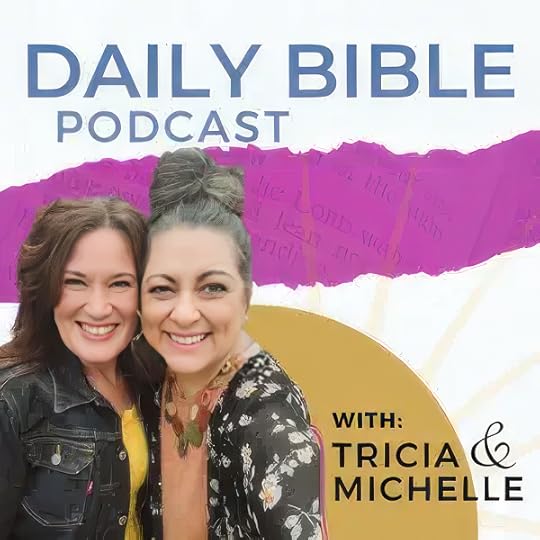
We’re Tricia and Michelle, two friends inviting you to join us in reading through the Bible chronologically this year. Reading the Bible every day can be a challenge. We’re here to summarize each day’s passage and provide action steps … in under 15 minutes. Grab a buddy and join our community. Take the plunge, and let’s read through the Bible together. We’ll be cheering you on all the way!
You can join us using your own One Year Bible© (if you’d like to purchase one, you can grab your preferred version using the links below). Or you can print up the One Year Chronological Reading Plan. If you don’t have a copy of the One Year Bible©, we will have the exact passages for the next day in the show notes. You can also subscribe to the One Year Chronological Bible Reading plan on the YouVersion Bible App.
Join us here.The post The Reason We Celebrate: A Christmas Reflection appeared first on Tricia Goyer.December 23, 2024
The Perfect Family Christmas Movie Night!
Christmas is a season of celebration, reflection, and connection. As parents, we should look for every opportunity during the holidays to immerse ourselves and our children in the true meaning of Christmas—the birth of Jesus. One beautiful way to do this is by watching The Star, a delightful animated movie that brings the Nativity story to life in a way that is both entertaining and meaningful.

Released a few years ago, The Star continues to be a favorite in our household, and I couldn’t recommend it more highly for every family this season. This movie tells the Nativity story through the eyes of Bo, a small but brave donkey, and his animal companions, highlighting themes of hope, teamwork, and the significance of small acts of faith.
The film is both humorous and heartfelt, filled with stellar voice acting, vibrant animation, and a wonderful soundtrack. Most importantly, it stays true to the heart of the Christmas story, making it an excellent choice for sharing biblical truths with your children.
Why The Star Is a Must-Watch for Families
In The Star, the story of Jesus’ birth unfolds through the eyes of Bo, a donkey yearning for a life of adventure. His journey leads him to Mary and Joseph, where he unexpectedly becomes part of God’s grand plan.
The movie captures the essence of the Nativity story while incorporating humor and adventure to engage kids of all ages. It explores themes of obedience, faith, and the joy of serving a higher purpose.
Here are a few highlights from the movie:
Mary’s Faith and Obedience: The angel’s visit to Mary and her humble, faith-filled response are beautifully portrayed, introducing children to her role in God’s plan.The Journey to Bethlehem: The movie brings the challenges and realities of Mary and Joseph’s journey to life in a way that is accessible for young viewers.The Animals’ Perspective: Bo and his friends provide a fun and imaginative view of the Nativity, while still keeping the focus on Jesus’ birth.The Wise Men and King Herod: The contrast between the wise men’s journey to worship Jesus and Herod’s fear and selfishness is a great conversation starter about humility and worship.The voice cast, including Gina Rodriguez, Zachary Levi, and Patricia Heaton, adds depth and humor to the characters, making the movie enjoyable for adults as well as kids.
5 Fun Ideas for a The Star Christmas-Themed Watch PartyNativity Snack StationCreate a snack table featuring treats inspired by the movie. Include “sheep popcorn” (popcorn with marshmallow “wool”), star-shaped cookies, and a “donkey trail mix” of pretzels, raisins, and chocolate chips.Animal Craft CornerAfter watching the movie, have a craft session where kids can make paper plate donkeys or sheep. Talk about how God used Bo and his friends in the story, just like He uses us in His plans.Christmas KaraokePlay songs from The Star soundtrack and host a family karaoke session. It’s a great way to keep the joy and celebration going while reflecting on the message of the movie.Bible Study and ReflectionRead Luke 2:1–20 together as a family before or after the movie. Discuss the different characters in the Nativity story and how their faith and obedience played a role in God’s plan.Star-Gazing NightAfter the movie, head outside for some star-gazing. Talk about the Star of Bethlehem and how it led the wise men to Jesus. Reflect on how we can follow Jesus in our daily lives.A Movie That Brings the Christmas Story to LifeWhat makes The Star special is its ability to connect kids to the story of Jesus’ birth in a fun, engaging way. It provides opportunities for meaningful conversations about faith, obedience, and God’s love.
As Timothy Reckart, the movie’s director, shared, “Greatness comes in the most humble appearance, which is the message of the Christmas story itself.”
This simple yet profound truth is one that we can carry into our homes and hearts this holiday season.
So, grab some popcorn, gather your family, and enjoy The Star together, now available for streaming on Netflix and Amazon Prime or on DVD or Blu-ray! Let it be a moment to reflect, celebrate, and rejoice in the greatest gift of all—Jesus.
Disclaimer:I was invited to an all-expense paid trip to Los Angeles courtesy of Sony to attend the The Star press junket and screening in exchange for my coverage. No other compensation was provided. All views shared are completely my own.Homeschool Success Course
Are you feeling overwhelmed and uncertain about your homeschooling journey? Do you wish you had a roadmap to help you navigate the challenges and achieve success? Look no further than Tricia Goyer’s Homeschool Success video course! Tricia Goyer is a homeschooling expert with over 20 years of experience, and she has poured all of her knowledge and wisdom into this comprehensive course. In each video, Tricia shares practical tips and strategies for homeschooling, from choosing a curriculum to managing your time effectively.
With Homeschool Success, you’ll discover how to:Create a customized curriculum that meets your family’s unique needsDevelop a daily routine that maximizes your time and energyCultivate a love of learning in your children and inspire them to reach their full potentialFoster a positive homeschooling environment that nurtures relationships and builds characterNavigate the challenges of homeschooling with confidence and graceTricia’s warm and engaging teaching style will leave you feeling empowered and equipped to tackle any homeschooling challenge that comes your way. You’ll also receive a workbook with actionable steps and reflection questions to help you apply your learning to your homeschooling journey. Take advantage of this opportunity to learn from one of the most respected homeschooling experts in the industry. Enroll in Tricia Goyer’s Homeschool Success video course today and start your journey to homeschooling success!
Homeschool Success Course only $9 Homeschool Success Course only $9Purchase the course here.The post The Perfect Family Christmas Movie Night! appeared first on Tricia Goyer.
Homeschool Success Course only $9Purchase the course here.The post The Perfect Family Christmas Movie Night! appeared first on Tricia Goyer.
The Christmas Story: A Fun Take on a Family Tradition
We love family traditions in the Goyer household. Many years ago, my husband, John, came up with this simple and interactive idea to help us all to truly integrate the Christmas story into their hearts and minds. It was so fun that we’ve continued the activity and made it a yearly tradition. The kids and grandkids love it and look forward to it every year!
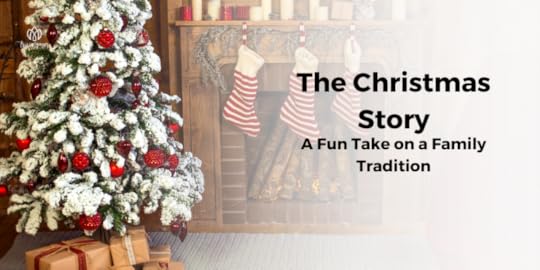 Simple Christmas Memory-Making
Simple Christmas Memory-MakingChristmas for the Goyers means large family gatherings. There are tons of presents (I can’t help myself), good food, and family gathered from all over the world. We enjoy every second together, but this is our favorite family tradition by far. It’s one that we share with our adult kids, parents, grandparents, and grandkids alike!
Below is the Scripture passage of the birth of Jesus. You’ll notice that some of the words are bolded. Each of the bolded words has a “sound effect” that goes with it. When the words in bold are read aloud, the person who has the corresponding slip of paper with that name on it makes their sound.
Instructions:Print the story and the sound effects on slips of paper and have family members draw them from a jar. If you have little ones, have them sit with an older child or adult to help, if needed. As the Bible story is read, everyone listens closely for their name and says their sound effect at the right time.
When a bolded word in the story is spoken, the reader must pause to allow the participant assigned the word to call out their part. For instance, when the word Jesus is read, pause to allow the assigned participant to call out, “God Saves.”
This allows readers and listeners to participate in the Christmas story. Feel free to change the call-out phrase to fit your audience of participants.
It’s a fun way to share the Bible Story and get family members of all ages involved!
Name KeyThe Story: The Birth Of JesusGabriel = Hallelujah! Hallelujah!
Joseph = a righteous man & daddy
Mary = blessed among women
Jesus = God saves
Birth = ouchie ouchie
Immanuel = God is with us
Baby = wwaahhh!
Census = More Taxes
Bethlehem = Town of David
David = Heart after God
Manger = Chomp Chomp Chomp
Shepherds = baaa baaa
Herod = I am evil (in an evil voice)
Wise men = hmmmm (stroking chin)
(from The Message Bible)
In the sixth month of Elizabeth’s pregnancy, God sent the angel Gabriel to the Galilean village of Nazareth to a virgin engaged to be married to a man descended from David. His name was Joseph, and the virgin’s name, Mary. Upon entering, Gabriel greeted her: “Good morning! You’re beautiful with God’s beauty, Beautiful inside and out! God be with you.”
Mary was thoroughly shaken, wondering what was behind a greeting like that. But Gabriel assured her, “Mary, you have nothing to fear. God has a surprise for you: You will become pregnant and give birth to a son and call his name Jesus. He will be great, be called ‘Son of the Highest.’ The Lord God will give him the throne of his father David; He will rule Jacob’s house forever—no end, ever, to his kingdom.”
Mary said to Gabriel, “But how? I’ve never slept with a man.”
Gabriel answered, “The Holy Spirit will come upon you, the power of the Highest hover over you; Therefore, the child you bring to birth will be called Holy, Son of God. And did you know that your cousin Elizabeth conceived a son, old as she is? Everyone called her barren, and here she is six months pregnant! Nothing, you see, is impossible with God.”
And Mary said, “ Yes, I see it all now: I’m the Lord’s maid, ready to serve. Let it be with me just as you say. “
Then Gabriel left her.
Before they came to the marriage bed, Joseph discovered Mary was pregnant. (It was by the Holy Spirit, but he didn’t know that.) Joseph, displeased but noble, determined to take care of things quietly so Mary would not be disgraced.
While Joseph was trying to figure a way out, he had a dream. Gabriel spoke in the dream: “Joseph, son of David, don’t hesitate to get married. Mary’s pregnancy is Spirit-conceived. God’s Holy Spirit has made her pregnant. She will bring a son to birth, and when she does, you, Joseph, will name him Jesus, because he will save his people from their sins. This would bring the prophet’s embryonic sermon to full term: Watch for this—a virgin will get pregnant and give birth to a son; they will name him Immanuel.
Then Joseph woke up. He did exactly what Gabriel commanded in the dream: He married Mary. But he did not consummate the marriage until she had the baby. He named the baby Jesus.
About that time Caesar Augustus ordered a census to be taken throughout the Empire.
This was the first census when Quirinius was governor of Syria. Everyone had to travel to his own ancestral hometown to be accounted for. So Joseph went from the Galilean town of Nazareth up to Bethlehem in Judah, for the census. As a descendant of David, he had to go there. He went with Mary, his fiancée, who was pregnant. While they were there, the time came for her to give birth. She gave birth to a son, her firstborn. She wrapped him in a blanket and laid him in a manger, because there was no room in the inn.
There were shepherds camping in the neighborhood. They had set night watches over their sheep. Suddenly, Gabriel stood among them and God’s glory blazed around them. The shepherds were terrified. Gabriel said, “Don’t be afraid. I’m here to announce a great and joyful event that is meant for everybody, worldwide: A Savior has just been born in David‘s town, a Savior who is Messiah and Master. This is what you’re to look for: a baby wrapped in a blanket and lying in a manger.”
At once Gabriel was joined by a huge angelic choir singing God’s praises: “Glory to God in the heavenly heights, Peace to all men and women on earth who please him.”
As the angel choir withdrew into heaven, the shepherds talked it over. “Let’s get over to Bethlehem as fast as we can and see for ourselves what God has revealed to us.” They left, running, and found Mary and Joseph, and the baby Jesus lying in the manger. Seeing was believing. They told everyone they met what Gabriel had said about this baby. All who heard the shepherds were impressed.
Mary kept all these things to herself, holding them dear, deep within herself. The shepherds returned and let loose, glorifying and praising God for everything they had heard and seen. It turned out exactly the way they’d been told!
After Jesus was born in Bethlehem—this was during Herod‘s kingship—a band of wise men arrived in Jerusalem from the East. They asked around, “Where can we find and pay homage to the newborn King of the Jews? We observed a star in the eastern sky that signaled his birth. We’re on pilgrimage to worship him.”
When word of their inquiry got to Herod, he was terrified—and not Herod alone, but most of Jerusalem as well. Herod lost no time. He gathered all the high priests and religious scholars in the city together and asked, “Where is the Messiah supposed to be born?”
They told him, “Bethlehem, Judah territory. The prophet Micah wrote it plainly: It’s you, Bethlehem, in Judah’s land, no longer bringing up the rear. From you will come the leader who will shepherd-rule my people, my Israel.
Herod then arranged a secret meeting with the scholars from the East. Pretending to be as devout as they were, he got them to tell him exactly when the birth-announcement star appeared. Then he told them the prophecy about Bethlehem, and said, “Go find this baby. Leave no stone unturned. As soon as you find him, send word and I’ll join you at once in your worship.”
Instructed by Herod, the wise men set off.
Then the star appeared again, the same star the wise men had seen in the eastern skies. It led them on until it hovered over the place of the baby. They could hardly contain themselves: They were in the right place! They had arrived at the right time!
The wise men entered the house and saw the baby in the arms of Mary, his mother. Overcome, they kneeled and worshiped him. Then the wise men opened their luggage and presented gifts: gold, frankincense, myrrh. In a dream, the wise men were warned not to report back to Herod. So they worked out another route, left the territory without being seen, and returned to their own country.
After the wise men were gone, Gabriel showed up again in Joseph‘s dream and commanded, “Get up. Take the baby and his mother Mary and flee to Egypt. Stay until further notice. Herod is on the hunt for this baby, and wants to kill him.”
Joseph obeyed. He got up, took the baby and his mother Mary under cover of darkness.
They were out of Bethlehem and well on their way by daylight. They lived in Egypt until Herod‘s death. This Egyptian exile fulfilled what Hosea had preached: “I called my son out of Egypt.”
I sincerely hope you and your family enjoy this fun family tradition as much as mine has! Our family has grown so much over the years, so it gets better every year. Please leave a comment and share with us if you decide to make this a tradition for your family this year!
Download the story and sound effect key here and read the Christmas story as a family!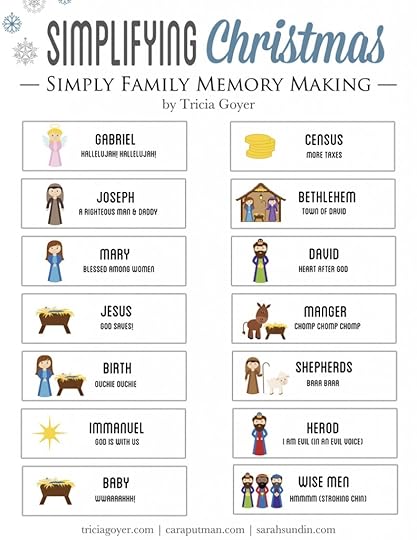
Additional ResourcesDaily Bible Podcast

We’re Tricia and Michelle, two friends inviting you to join us in reading through the Bible chronologically this year. Reading the Bible every day can be a challenge. We’re here to summarize each day’s passage and provide action steps … in under 15 minutes. Grab a buddy and join our community. Take the plunge, and let’s read through the Bible together. We’ll be cheering you on all the way!
You can join us using your own One Year Bible© (if you’d like to purchase one, you can grab your preferred version using the links below). Or you can print up the One Year Chronological Reading Plan. If you don’t have a copy of the One Year Bible©, we will have the exact passages for the next day in the show notes. You can also subscribe to the One Year Chronological Bible Reading plan on the YouVersion Bible App.
Join us here. The post The Christmas Story: A Fun Take on a Family Tradition appeared first on Tricia Goyer.


